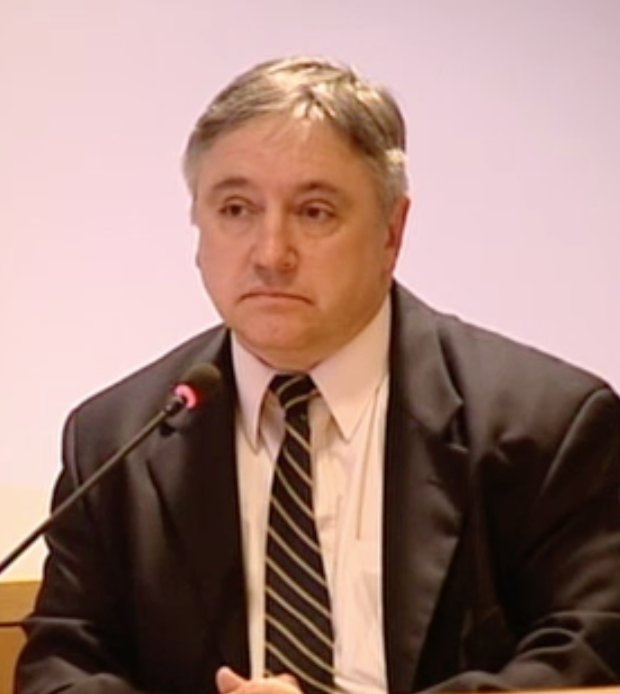
Bob Mackin
Growing up in Quebec, Pierre Lemaitre dreamed of someday wearing the red serge of the Royal Canadian Mounted Police. That finally came true when he graduated into the force on his birthday in 1986.
He took pride in putting on his uniform before each shift, but that all changed one fateful morning in 2007. His widow, Sheila Lemaitre, testified on Nov. 26 at a coroner’s inquest in Burnaby about the five-and-a-half year descent into depression, anger and post-traumatic stress disorder that ended in the suicide of the 55-year-old.
Pierre Lemaitre worked in detachments in Kamloops, Cranbrook, Bella Coola and Prince George before he was transferred to Langley at the same time as Sheila was sent to Richmond. A post in media relations at regional headquarters took him to the Okanagan when wildfires spread in the summer of 2003 and his first experience butting heads with the old boys’ culture. A member of the media confided in him that an RCMP member, his superior, had sexually harassed her.

Pierre Lemaitre at the Braidwood Inquiry (CBC)
“Protocol demands and Pierre’s sensibilities demand even stronger that he make a formal report about that,” Sheila Lemaitre testified. “But that meant going over his supervisor’s head, which is also something that is not done.”
That resulted in a transfer to Chilliwack. Punishment for doing the right thing, she said.
“Pierre was very stressed out over it, very upset over the way he had been treated,” she said.
The force eventually apologized, but instead of welcoming him back to headquarters, Lemaitre went to Burnaby as its spokesman. Another tour of duty at headquarters led to an early morning wake-up call on Oct. 14, 2007.
“‘Yep, they need me, I’ve gotta go to work’,” she remembered him saying. “He put on his uniform, I didn’t see that look thereafter.”
A Polish tourist who came to B.C. to visit his mother had died in an altercation after arriving at Vancouver International Airport. Lemaitre’s initial statement put the blame on the man, later identified as Robert Dziekanski, for jeopardizing the safety of the attending officers. But eyewitness video seized the day of the incident showed otherwise. Officers acted hastily with a Taser in a deadly, botched arrest.
Lemaitre was the face and voice of the RCMP in B.C. and he wanted to set the record straight. The head of the Integrated Homicide Investigation Team, Wayne Rideout, refused.
“There started to be media reports about Pierre being an RCMP spin doctor, the RCMP liar, that really upset him,” Sheila Lemaitre said. “At one point he was almost screaming, I want it corrected, I want to tell them. He wasn’t allowed to. He was ordered not to. That really upset him from that point, it was very hard for him.”
His life was never the same, as he spiralled into depression, anxiety, anger and post-traumatic stress disorder. He was demoted and then transferred to Langley, for its traffic planning and training division. The Braidwood Inquiry in 2009 gave him hope.
“I remember him coming through the door. He said Braidwood understands, he knows how hard it was for me, he got it. There was a sense of relief. It was somewhat short-lived.”
His position was eventually relocated to E Division’s new, 2012-built headquarters in Surrey’s Green Timbers. An officer, Insp. Boucher, was showing another officer around the new complex.
“He heard this officer say, ‘oh, yeah, and that’s Pierre Lemaitre, he’s redundant’.”
Lemaitre was despondent, she said, crying on the phone. She said he should come home. He never returned to active duty.
“Pierre changed from being the most-caring, loving sweetest husband, the guy who would open all the doors for you.”
She said he felt shame for being recognized in public, as that RCMP officer from YVR, and would even run away from grocery checkouts when that happened. He became a hoarder, filling a room in the basement with hobby kits, some of them unopened, and used furniture from Craigslist. There were four sofas.
“After YVR 2007, he got progressively angrier and more and more anxious.”
She said he started becoming abusive, throwing her on the ground and strangling her, leaving her bruised and in pain for weeks. He threw her down the stairs at their home, after she had a knee operation. She said he often spoke of a “rage in his head [that] was burning in his head and he can’t control it.”
“I could only think that If I called 9-1-1, they would take his gun, they’d take his badge and I couldn’t do that, he’d already lost so much. Honestly that’s when I thought he would commit suicide. I thought I was holding him together, with me he could survive it.”
His medication was changed approximately four weeks before his death. What was the last weekend of his life, Sheila thought he had turned a corner.
“I actually thought that he was getting better, he’d switched medication for four weeks and that last four days, he seemed to eager to do little things around the house that I had wanted him to do, I always nagged him that we should have extra water in case of emergency and he was always reticent to go out and get big bottles from Costco or wherever, laughing at me saying I was always talking about apocalypse. Living on a farm I thought this was a good thing to do.”

Robert Dziekanski (Braidwood Inquiry)
He also got fertilizer and bags of dog food. Sheila said her ability to lift is encumbered by that injury.
On July 29, 2013, Sheila remembered that Pierre was strangely quiet. He knew that Bill Bentley, one of the four arresting officers from the airport incident, was going to court for a verdict in his perjury trial. Sheila said she kept the TV news on mute, but the ticker at the bottom of the screen mentioned that day’s court appearance.
She went to pick blueberries for breakfast with their dogs, but soon realized Pierre didn’t join them outside. She returned to the house in a panic, unable to find him in any of the rooms, except the rec room, where he was hanging from an exercise machine. She desperately tried to help before calling 9-1-1.
Two ambulance paramedics testified at the inquest that they found Pierre Lemaitre on the floor. A dog leash and collar were nearby, and seven vials of medication, including anti-depressants, were on a bench. Senior paramedics took over from the first crew that arrived, but couldn’t restart his heart. As per protocol, the paramedics consulted an emergency room doctor from the nearby hospital by phone. There was nothing more they could do.
The next day, Sheila Lemaitre testified, she discovered that the coffee container Pierre had steadfastly replenished was completely empty. “Everything hit me then, he hadn’t planned on needing it. That last three, four days he had a plan, he knew what he was doing, he was making sure that I was going to be okay for a bit.”
Coroner Vincent Stancato and a five-person jury are presiding over a coroner’s inquest in Burnaby that is expected to run through Nov. 30. The task is about finding fact and making recommendations to prevent similar deaths. Too many first responders suffering extreme work-related stress have died in Canada. The Tema Conter Memorial Trust, which keeps track of public safety suicides in, shows there were 46 British Columbia first responders who died from 2015-2017.
In the gallery, an analyst from the RCMP was taking detailed notes, sitting near Walter Kosteckyj. The former RCMP officer who was the lawyer for Dziekanski’s mother, Sofia Cisoski.
“This is a thoroughly decent man who was placed into a very difficult position and unable to clear the record [about the tasering of Dziekanski at YVR] when he wanted to,” Kosteckyj said. “He asked me to send the apologies to my client, so that she would know he himself took no part in trying to mislead the public or media about the events.”
Said Kosteckyj: “I feel for his family, I’m just here to send my personal support.”
Support theBreaker.news for as low as $2 a month on Patreon. Find out how. Click here.










